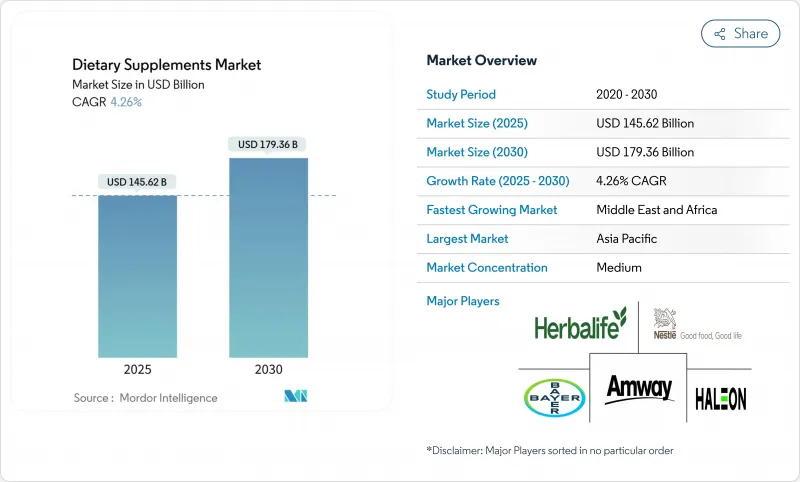
|
市場調査レポート
商品コード
1849817
栄養補助食品:市場シェア分析、産業動向、統計、成長予測(2025年~2030年)Dietary Supplements - Market Share Analysis, Industry Trends & Statistics, Growth Forecasts (2025 - 2030) |
||||||
カスタマイズ可能
適宜更新あり
|
|||||||
| 栄養補助食品:市場シェア分析、産業動向、統計、成長予測(2025年~2030年) |
|
出版日: 2025年06月11日
発行: Mordor Intelligence
ページ情報: 英文 150 Pages
納期: 2~3営業日
|
概要
栄養補助食品市場規模は2025年に1,456億2,000万米ドルを計測し、2030年には1,793億6,000万米ドルに達し、CAGR 4.26%で成長すると予測されています。

同市場は、予防ヘルスケアとウェルネス管理を重視する消費者の増加により、大きな変革期を迎えています。健康意識の高まり、高齢化、新興経済諸国における可処分所得の増加など、いくつかの要因がこの成長を後押ししています。免疫系強化、消化器系の健康最適化、栄養欠乏症予防をターゲットとしたサプリメントへの需要が強まっています。業界は、従来の錠剤やカプセルから、グミ、リキッドショット、機能性飲料などの高度なデリバリー形式を取り入れるようになりました。これらの技術革新は、バイオアベイラビリティや嗜好性の向上を通じてサプリメントの効能を高めると同時に、摂取の利便性を求める消費者の嗜好に対応しています。
世界の栄養補助食品市場の動向と洞察
予防ヘルスケアへの注目の高まり
2023年4月に米国疾病予防管理センター(CDC)が発表した包括的データによると、米国では成人の58.5%、子供の34.8%が健康法に栄養補助食品を取り入れており、ヘルスケアのパラダイムは反応型から予防型へと根本的に変化しています。このような消費者行動の大きな変化により、栄養補助食品は、従来の欠乏症治療ではなく、積極的な健康維持のために特別に処方された製品として、大きな市場需要を生み出しています。市場分析によると、免疫システムの強化、ストレス管理の最適化、睡眠の質の向上など、目標とする健康機能のために設計されたサプリメントに対する消費者の嗜好が顕著に増加していることがわかります。主に長期的な医療支出を最小限に抑えることを目的とした、世界的な医療制度による予防医療措置の体系的な実施は、栄養補助食品市場の持続的な拡大と浸透を非常に助長する環境を確立しています。
女性消費者をターゲットにしたサプリメントが成長を促進
女性の健康サプリメント市場は、栄養補助食品業界内で大幅な拡大を示しており、従来の妊産婦向けサプリメントにとどまらず、女性特有の健康要件に対応する製品の多様化が特徴です。この市場には、更年期管理、ホルモン平衡、生殖の健康をターゲットとした特殊な栄養製剤が含まれます。製品開発は、ストレス管理成分と美容向上特性、ホルモン調整とエネルギー最適化要素を組み込んだ、様々な健康上の利点を統合した多機能性栄養補助食品にますます焦点が当てられています。女性は家庭内でヘルスケアの第一決定権を持つことが多いため、サプリメントの嗜好は市場力学に大きな影響を与えます。2024 Women's Health Innovation Opportunity Map Progress Report(2024年女性の健康革新機会マップ進捗報告書)によると、この分野は資金配分の強化やイノベーションセンターによって進歩を示しているもの、がん以外の女性特有の疾患は世界のヘルスケア研究開発資金のわずか1%しか受けていないです。
成長を阻む偽造品の存在
偽造・粗悪サプリメントの蔓延は、消費者の信頼を根本的に損ない、見込み消費者の間に重大な安全性への懸念を生じさせることによって、市場成長の実質的な抑制要因となっています。この障害は、規制当局の監視が不十分なために偽造品が市場で大きな存在感を示すことができる新興市場において、特に深刻な形で表れています。その影響は、直接的な収益損失だけでなく、風評被害や合法的な製造事業者のコンプライアンス費用の増加にも及んでいます。さらに、デジタルマーケットプレースの環境は、模倣品の流通を促進するサードパーティーベンダーのプラットフォームを通じて、この課題を悪化させています。2023年に欧州連合(EU)の税関当局が摘発した模倣品の総額は34億ユーロと推定され、前年比77%増となりました。
セグメント分析
2024年の市場シェアでは、ビタミン類が27.11%を占め、種類別では最大です。このリーダー的地位は、ビタミンの効果が実証されていることと、ヘルスケア専門家による一貫した支持によるものです。マルチビタミンのサプリメントは依然として新規消費者向けの主要参入製品である一方、個別ビタミン、特にビタミンDとビタミンCは、その免疫強化特性により成長を示しています。
プレバイオティクス・プロバイオティクス分野は、2025~2030年のCAGRが9.61%と市場全体の成長率を上回る見込みです。プレバイオティクス・プロバイオティクス分野の拡大を牽引しているのは、腸と脳のつながりや健康におけるマイクロバイオームの重要性を裏付ける科学的証拠の増加です。これらのサプリメントは、胃腸の健康、免疫機能、様々な病状に効果があることが実証されています。シンバイオティクスとして組み合わせると、腸の健康状態が改善され、肥満、糖尿病、精神疾患の管理における可能性が示されます。さらに、ミネラル、脂肪酸、タンパク質のサプリメントは一貫した市場プレゼンスを維持しているが、ハーブのサプリメントは地域の伝統医学の慣習に基づき、地域によって成長パターンが異なります。酵素サプリメントは主に消化器系の健康への応用に重点を置き、ブレンドサプリメントは単一の製剤で複数の健康効果をもたらすことで人気を博しています。
カプセルとソフトジェルは2024年の市場シェアで38.00%を占め、その主な理由は敏感な成分を保護し、正確な用量を提供できることです。このフォーマットは、成分の安定性と放出制御が製品の有効性に不可欠な、医薬品に隣接するカテゴリーで依然として普及しています。グミ分野は大きな成長を遂げており、2025~2030年のCAGRは12.01%と予測され、他のすべての送達形態を上回っています。この成長は、口当たりのよい摂取方法を求める消費者の嗜好と、苦味成分をマスキングする同フォーマットの有効性に起因しています。
ビタミン・グミ市場は、健康志向の高まりと機能性食品への需要に牽引されて、大きな成長の可能性を示しています。取引データによると、過去10年間、特にナイジェリアと米国で着実に拡大しています。錠剤は製造効率とコスト面でメリットがある一方で、その溶解速度に対する消費者の認識は依然として課題です。同様に、粉末は投与量の柔軟性から、スポーツ栄養やタンパク質サプリメントにおいてその重要性を維持しています。液体タイプは、迅速な吸収を必要とする用途や、錠剤の摂取が苦手な消費者、特に高齢者や子供の間で成長を続けています。
地域分析
アジア太平洋地域は、2024年の栄養補助食品世界市場の49.48%を占め、支配的な地域セグメントとなっています。この地位は、大規模な人口基盤、可処分所得の増加、予防的健康習慣を重視する文化的伝統に起因します。中国とインドが主要な成長促進要因として機能する一方、日本は健康的な高齢化対策に焦点を当てた成熟市場を維持しています。eコマースの拡大により、この地域の市場全体でプレミアムサプリメントブランドへのアクセスが増加しています。
北米は第2位の市場であり、一人当たりの消費量が高く、製品革新を可能にする体系的な規制環境が整っています。Council for Responsible Nutritionの2023年調査によると、米国の成人の74%がサプリメントを定期的に利用しており、92%がサプリメントは健康に不可欠であると考えています。欧州は第3位の市場であり、健康強調表示の科学的検証と規制遵守に重点が置かれています。欧州市場の成長は、人口動態の高齢化と、予防医療におけるサプリメント摂取を認めるヘルスケア制度を反映しています。
中東・アフリカ地域は、2025~2030年のCAGRが7.83%と、全地域の中で最も高い成長が見込まれています。この成長は、健康意識の高まり、中間層の人口拡大、小売インフラの改善から生じています。南米市場の成長はブラジル、アルゼンチン、チリに集中しており、健康志向の高まりと消費者層全体の小売網の拡大がその原動力となっています。
その他の特典:
- エクセル形式の市場予測(ME)シート
- 3ヶ月間のアナリストサポート
よくあるご質問
目次
第1章 イントロダクション
- 調査の前提条件と市場の定義
- 調査範囲
第2章 調査手法
第3章 エグゼクティブサマリー
第4章 市場情勢
- 市場概要
- 市場促進要因
- 予防ヘルスケアへの重点化
- 女性消費者をターゲットにしたサプリメントが成長を促進
- クリーンラベル、植物由来、ビーガン製品への人気が高まっている
- 健康的な老化に焦点を当て、消費者のマルチビタミン摂取を加速
- eコマースの成長によりサプリメントの入手しやすさと市場へのリーチが向上
- 研究開発投資が革新的な製品開発とターゲットソリューションを推進
- 市場抑制要因
- 偽造品の存在が成長を阻害
- 合成添加物に対する消費者の懐疑心の高まりと大量摂取の安全性への懸念
- 栄養補助食品および境界製品に対する規制強化
- 地元生産者による価格競争が利益率を低下させる
- 規制の見通し
- テクノロジーの展望
- ポーターのファイブフォース分析
- 新規参入業者の脅威
- 買い手の交渉力
- 供給企業の交渉力
- 代替品の脅威
- 競争企業間の敵対関係
第5章 市場規模と成長予測(価値、10億米ドル)
- 製品タイプ別
- ビタミン
- ビタミンA
- ビタミンC
- ビタミンD
- ビタミンB
- その他のビタミンサプリメント
- マルチビタミンサプリメント
- 鉱物
- 鉄サプリメント
- カルシウムサプリメント
- マグネシウムと亜鉛のサプリメント
- マルチミネラルサプリメント
- その他の鉱物
- 脂肪酸
- タンパク質とアミノ酸
- プレバイオティクスとプロバイオティクスのサプリメント
- ハーブサプリメント
- 酵素
- ブレンドサプリメント
- その他
- ビタミン
- 形態別
- タブレット
- カプセルとソフトジェル
- 粉末
- グミ
- 液体
- その他
- ソース別
- 植物由来
- 動物由来
- 合成/発酵由来
- 消費者グループ別
- 男性
- 女性
- 子供
- 健康アプリケーション
- 一般的な健康とウェルネス
- 骨と関節の健康
- エネルギーと体重管理
- 胃腸と腸の健康
- 免疫力強化
- 心臓血管の健康
- 糖尿病管理
- 認知とメンタルヘルス
- スキンケア、ヘアケア、ネイルケア
- 目の健康
- その他の健康アプリケーション
- 流通チャネル別
- スーパーマーケット/ハイパーマーケット
- 専門店
- オンライン小売チャネル
- 直接販売
- その他流通チャネル
- 地域別
- 北米
- 米国
- カナダ
- メキシコ
- その他北米地域
- 欧州
- ドイツ
- フランス
- 英国
- スペイン
- オランダ
- イタリア
- スウェーデン
- ポーランド
- ベルギー
- その他欧州地域
- アジア太平洋地域
- 中国
- インド
- 日本
- オーストラリア
- 韓国
- インドネシア
- タイ
- シンガポール
- その他アジア太平洋地域
- 南米
- ブラジル
- アルゼンチン
- チリ
- コロンビア
- ペルー
- その他南米
- 中東・アフリカ
- アラブ首長国連邦
- 南アフリカ
- ナイジェリア
- サウジアラビア
- エジプト
- モロッコ
- トルコ
- その他中東・アフリカ地域
- 北米
第6章 競合情勢
- 市場集中度
- 戦略的動向
- 市場シェア分析
- 企業プロファイル
- Amway Corporation
- Herbalife Ltd.
- Nestle S.A.
- Bayer AG
- Haleon plc
- Abbott Laboratories
- Suntory Holdings Ltd.
- Otsuka Holdings Co. Ltd.
- Glanbia PLC
- Church and Dwight Co. Inc.
- Now Health Group Inc.
- Vitabiotics Ltd.
- H&H Group(Swisse)
- Reckitt Benckiser Group PLC
- Vital Health Foods(Pty)Ltd
- 21st Century HealthCare, Inc.
- Kirin Holdings Company, Limited.
- Jamieson Wellness Inc.
- Harbin Pharmaceutical Group
- Dr. Willmar Schwabe GmbH & Co. KG


